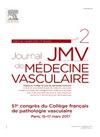晚期消化道癌复发性静脉血栓栓塞的管理挑战:病例研究和治疗策略。
Q3 Medicine
引用次数: 0
摘要
导言:静脉血栓栓塞症(VTE)是癌症患者,尤其是晚期恶性肿瘤患者面临的一项重大挑战。复发性 VTE 的治疗非常复杂,既要有效抗凝,又要解决潜在的癌症进展问题:我们介绍两例来自法国珀西军事医院消化内科的临床病例,患者均患有进展性恶性消化系统疾病。患者 1 是一名 62 岁的女性,尽管使用低分子量肝素(LMWH)进行了适当的抗凝治疗,但仍反复出现肺栓塞。经过治疗调整后,她最终死于肿瘤进展。患者 2 是一名 54 岁的男性,因肺栓塞住院,面临上消化道出血和抗凝治疗启动延迟的问题。虽然他在接受免疫治疗后病情初步好转,血栓事件也趋于稳定,但他经历了肿瘤进展和 VTE 复发,最终不得不接受姑息治疗:这些病例说明,即使采用治疗性抗凝剂和剂量升级,也很难控制复发性 VTE。在 VTE 复发的情况下,调查癌症进展并确保患者坚持治疗至关重要。综合治疗策略应涉及恶性肿瘤和血栓并发症:癌症患者复发性 VTE 的治疗需要多学科方法,以评估调整抗凝治疗的收益风险比。这些临床病例凸显了综合治疗的必要性,既要解决肿瘤问题,又要解决血栓问题,强调了及时干预和医疗服务提供者之间合作的重要性。本文章由计算机程序翻译,如有差异,请以英文原文为准。
Management challenges of recurrent venous thromboembolism in advanced digestive cancers: Case studies and therapeutic strategies
Introduction
Venous thromboembolism (VTE) poses a significant challenge in cancer patients, particularly those with advanced malignancies. The management of recurrent VTE is complicated by the need for effective anticoagulation while addressing the underlying cancer progression.
Cases
We present two clinical cases from the gastroenterology department at Percy French military hospital involving patients with progressive malignant digestive diseases. Patient 1, a 62-year-old woman, developed recurrent pulmonary embolism despite appropriate anticoagulation with low molecular weight heparin (LMWH). After treatment adjustments, she ultimately succumbed to tumor progression. Patient 2, a 54-year-old man hospitalized for pulmonary embolism, faced upper gastrointestinal bleeding and delayed anticoagulation initiation. Although he showed initial improvement with immunotherapy and stabilization of thrombotic events, he experienced oncological progression and recurrent VTE, leading to palliative care.
Discussion
These cases illustrate the difficulties of managing recurrent VTE, even with curative anticoagulation and dose escalation. In case of VTE recurrence, it is essential to investigate for cancer progression and ensure patient adherence to treatment. A comprehensive management strategy should involve both the malignancy and the thrombotic complications.
Conclusion
The management of recurrent VTE in cancer patients requires a multidisciplinary approach to evaluate the benefit-risk ratio of anticoagulation adjustments. These clinical cases highlight the necessity for integrated care that addresses both oncological and thrombotic concerns, emphasizing the importance of timely intervention and collaboration among healthcare providers.
求助全文
通过发布文献求助,成功后即可免费获取论文全文。
去求助
来源期刊

JMV-Journal de Medecine Vasculaire
Medicine-Cardiology and Cardiovascular Medicine
CiteScore
2.40
自引率
0.00%
发文量
184
期刊介绍:
The JMV- Journal de Médecine Vasculaire publishes peer-reviewed clinical and research articles, epidemiological studies, review articles, editorials, guidelines. The journal also publishes abstracts of papers presented at the annual sessions of the national congress of French College of Vascular Pathology.
 求助内容:
求助内容: 应助结果提醒方式:
应助结果提醒方式:


